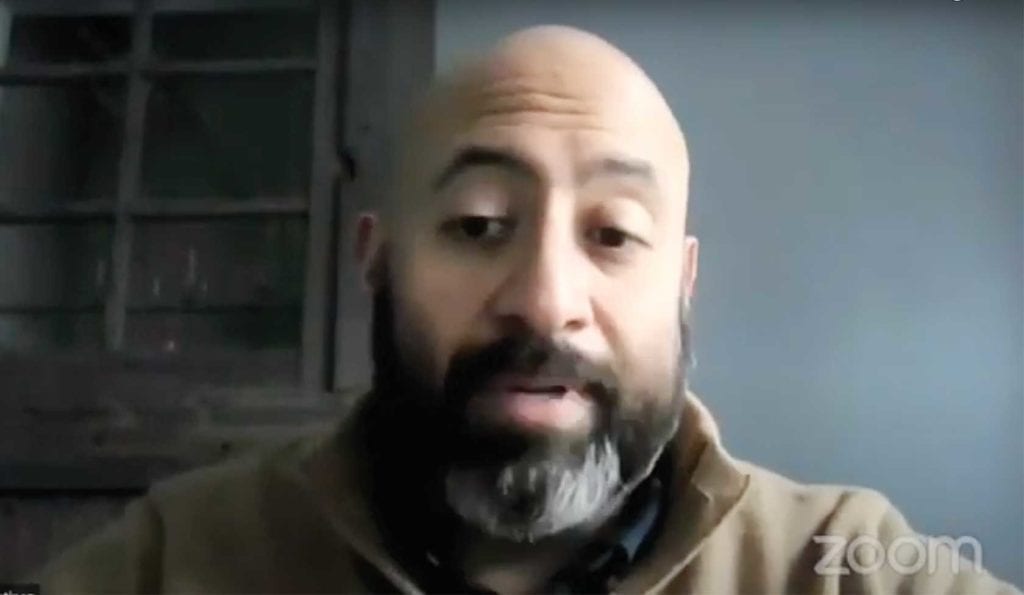Health centers key to city’s vaccine effort
Health officials detail plans for vaccinations as state rollout lags

Health center leaders met with the Boston City Council Feb. 4 to talk about problems and solutions for a vaccine rollout that targets communities of color.
Local health centers all over Boston remain at the forefront of testing and vaccination rollout, facing the challenge of reaching their own patients in a timely manner. Mass vaccination centers at large venues such as Fenway Park distribute the bulk of doses, but health centers are tasked with reaching hesitant locals struggling with lack of transportation and limited access to appointments.
Councilors questioned a panel of public health experts, including Boston’s Health and Human Services Chief Marty Martinez, Boston Public Health Commission Medical Director Jennifer Lo, and leaders from Codman Square Health Center and East Boston Neighborhood Health Center.
Beginning the conversation on equity, Martinez expressed a desire for data specific to Boston as shots are distributed.
“We’re working hard to ensure that distribution efforts include communities and neighborhoods hardest hit by the pandemic. And it’s important to remember that’s by age, race, ethnicity and geography,” Martinez said.
Right now, the mass vaccination sites in Boston are able to administer about 1,000 shots a day, he said, the goal for next month being 3,000 a day. He identified the main challenges for those seeking vaccination as transportation time from work, ease of making an appointment, and proof of residency or identity. While limiting vaccinations to a certain location can make appointments easier to access, requiring patients to provide proof of residency is a deterrent.
Manny Lopes, president and CEO of East Boston Neighborhood Health Center, spoke on vaccine hesitancy in Latinx communities and how his health center combats it.
“There’s also a mistrust in government, particularly as it relates to those with different immigration status,” Lopes said. “Leveraging our trusted partners in the community, leveraging our staff as ambassadors to get the right information out, leveraging support from the city and the state as well [helps] us message this and build capacity
Though it isn’t as busy as Lopes would like it to be, he said that it’s important to be as open and available as possible so that they’re there when people are ready to be vaccinated, especially in the evening for essential workers.
Wanda McClain, vice president for community health and health equity at Brigham and Women’s Hospital, said that the current vaccine struggles point to hundreds of years of racial disparities in health care that public officials have ignored. McClain has seen a gap between her Black and white employees being vaccinated, and she has started implementing new strategies.
“We have question-and-answer sessions with our employees where, in a non-judgmental way, we listen to every question and attempt to provide the information they need to make an informed decision,” McClain said. “Employees who have been vaccinated do a ‘My why’ campaign, [called] ‘Why I got vaccinated.’” One of her staff members, for example, shared that he got vaccinated so he could hug his mom.
At the Codman Square Health Center, CEO Sandra Cotterell says she was pleased to see a 90% show rate of vaccine patients 75 and older despite the bad weather last week.
“[This] tells me that if we get the message out and educate them, we can make a difference,” Cotterell said. “I think it’s going to be very important that we look at ease of access and availability to fight this, and peer-to-peer education.”
Codman Square Health Center is not requiring IDs for individuals who want vaccines, nor do they require insurance.
Though the Boston Health and Human Services department doesn’t have direct control over health centers and hospitals, Martinez said he continues to look for new ways to support them as they reach out to the community. Right now, his team is exploring transportation options for seniors that gets them to sites without putting them in close contact with too many people.
“We have explored transportation options, in terms of several bus companies that have reached out … The problem is, we’re still in the days of COVID, so we cannot put 20 seniors on a bus and transport them to a location,” he said.
Martinez said that the city is working on ways to support vaccination centers as they face multiple challenges.
“We may not control those sites, but what we’re trying to do is ensure that that layer of cultural competency is there.”






